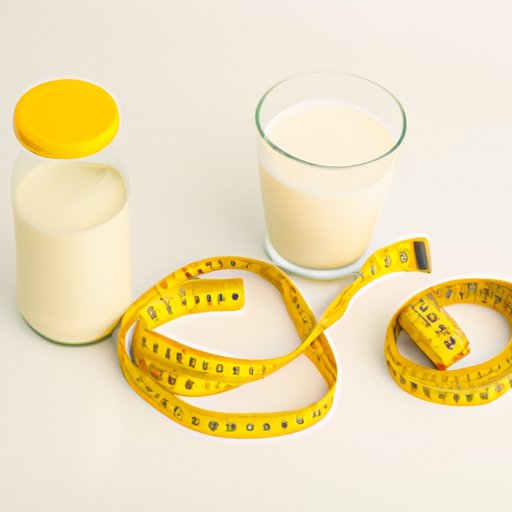
Introduction
Milk is a staple in many people’s diets, but there’s a common misconception that it can lead to weight gain. In this article, we will explore the relationship between milk and weight gain, as well as debunk some of the myths surrounding this topic.
The Science Behind Milk and Weight Gain: Debunking the Myths
Contrary to popular belief, milk is not a high-calorie beverage. In fact, an 8-ounce glass of 2% milk contains around 120 calories. Milk is also a good source of nutrients, including fat, protein, carbohydrates, vitamins, and minerals.
When it comes to weight gain, it’s important to understand how the body processes milk. Milk contains a type of protein called casein, which is slowly digested and can help you feel fuller for longer periods of time. This can potentially lead to decreased calorie consumption over time, thus aiding in weight management.
Exploring the Relationship Between Milk and Weight Gain: A Comprehensive Review
Numerous studies have investigated the relationship between milk consumption and weight gain, but the results have been mixed. Some studies suggest that increased milk consumption is associated with lower weight gain, while others have found no significant association.
One potential confounding factor is that people who consume more milk may also lead healthier lifestyles in general, which could affect their weight. Another consideration is that different types of milk, such as whole milk vs. skim milk, could have different effects on weight management.
While more research is needed, it’s important to take these factors into account when interpreting current studies on milk and weight gain.
Can Drinking Milk Actually Help You Lose Weight? Here’s What Experts Say
While there’s no clear consensus on whether drinking milk can aid in weight loss, some studies suggest that it can. For example, a 2016 review of studies found that consuming milk as part of a calorie-controlled diet led to greater weight loss compared to diets that didn’t include milk.
However, it’s important to note that these studies are limited in scope and should be interpreted with caution. It’s also worth keeping in mind that consuming too many calories, regardless of the source, can lead to weight gain.
The Pros and Cons of Consuming Milk for Weight Management
There are both pros and cons to consuming milk for weight management. On the positive side, milk is a good source of protein, which can help you feel full and satisfied. This can potentially lead to decreased calorie consumption over time. Additionally, the calcium in milk has been suggested to aid in weight management.
On the negative side, some people may be sensitive to lactose or may consume too many calories through milk, leading to weight gain. It’s important to consider your individual needs and goals when deciding whether to include milk in your diet.
Dairy-Free Diets: How Eliminating Milk Can Affect Your Weight
Eliminating milk from your diet can have both potential benefits and drawbacks in relation to weight management. For example, you may decrease your calorie consumption by eliminating milk, especially if you were consuming high-calorie milk products.
However, it’s important to note that milk is a good source of nutrients, including calcium and vitamin D. If you remove milk from your diet, it’s important to find alternative sources of these nutrients.
Conclusion
Overall, the relationship between milk and weight gain is complex and has yet to be fully understood by the scientific community. While some studies suggest that consuming milk can aid in weight management, others have found no significant association.
If you’re looking to manage your weight, it’s important to consider your individual needs and goals when deciding whether to include milk in your diet. Regardless of your decision, it’s always a good idea to seek advice from medical professionals and conduct your own research.





